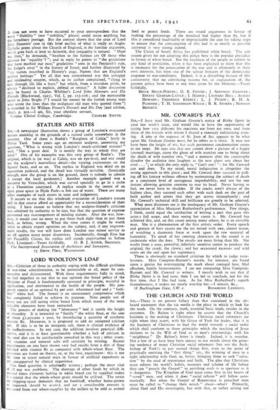MR. COWARD'S PLAY SIRS I have read Mr. Graham Greene's
notice of Bluhe Spirit in your last week's issue, and would like to have the opportunity of saying how very different his reactions are from my own, and from those of the friends with whom I shared a riotously exhilarating even- ing. A joke at the expense of St. Joan of Arc appears to be what upset Mr. Graham Greene most, for he refers to it twice. It may not have been the height of wit, but such portentous condemnation seems to me inept. He says also that one cannot draw a picture of a happy (second) marriage, cause the ghost of wife number one to bring about the death of wife number two, " and a moment after the catastrophe dissolve the audience into laughter as the new ghost sets about her rival ... "; to which the only reply is, "Can't one! ": for Mr. Coward can and does. To my mind, moral indignation is altogether the wrong approach to this piece ; and Mr. Coward does succeed in pull- ing off his fantasy without offence by maintaining the subject of death at a consistent level of outrageous improbability, and not for one instant allowing genuine emotion to rear its head. Never having to feel, we never have to shudder. If the cracks aren't always of the highest class, they succeed each other with such dash on the part of both author and actors that they get across triumphantly ; and Mr. Coward's technical skill and brilliance are greatly to be admired.
What most distresses me is the inadequacy of Mr. Graham Greene's appreciation of Miss Margaret Rutherford's performance. Few things, I think, could equal the satisfaction of writing a part that gave this actress full scope, and then seeing her create it. Mr. Coward has achieved this, and, on this count among many others, he is an enviable man. She is a phenomenon of the first artistic order. Every speech and gesture of hers causes me the joy mixed with awe, almost terror, of watching a daemonic force at work upon the raw material of humanity. To speak of her creating characters in the round is to understate what she does. The results are more living than life. She works from a sane, powerful, infinitely sensitive centre to produce the original, the crank, the clown ; and her occasional excesses and wild starts set the seal upon her supremacy.
There is obviously no standard criticism by which to judge taste- lessness. Miss Compton-Burnett's novels, for instance, are based upon a genius for overstepping the mark about conjugal love, filial affection, family bereavements. I am not comparing Miss Compton- Burnett and Mr. Coward as writers. I merely wish to say that if Blithe Spirit is in bad taste, then I am led to conclude, not for the first time, that I like bad taste. As for Miss Rutherford's superb shamelessness, it makes me nearly worship her.—I remain, &c.,

























 Previous page
Previous page